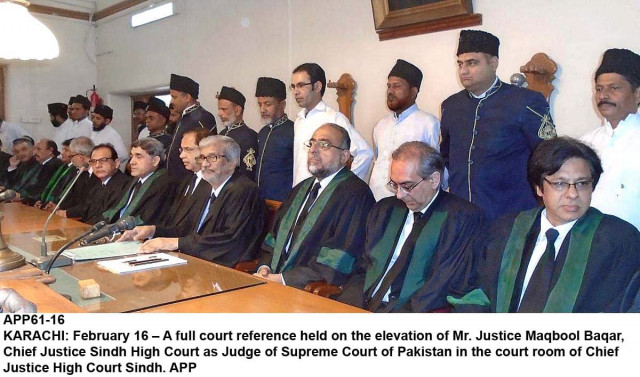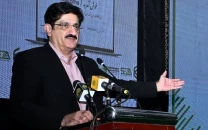Outgoing SHC chief justice says lower courts need urgent reforms
Maqbool Baqar was speaking at a full-court reference held in his honour

A full court reference held on the elevation of Mr Justice Maqbool Baqar, Chieft Justice Sindh High Court as Judge of Supreme Court of Pakistan in the court room of Chief Justice High Court Sindh. PHOTO: APP
He was speaking at a full-court reference held to mark his elevation to the Supreme Court. Like the chief justice before him, Baqar said, he had also sought reforms in the provincial judiciary.
As chief justice my duties and responsibilities extended to the whole province, he said, admitting that there can be no doubt that the situation in the subordinate judiciary in many respects was woeful and in urgent need for reforms. “Some steps have been taken in this direction as well but time, as always, has proven too short,” he regretted.
Baqar observed that the problems are systematic and will take time to root out. Quick fixes may sound good but this is that can be said for them, he said. If tackled resolutely, the problems facing the judicial system are neither insurmountable nor such that the timeframe for solving them is essentially beyond reach, he said.
“I have no doubt that as my colleagues fill the office that I am about to vacate, solutions will be found and implemented,” Baqar said. He urged the bar to play its due role in this regard. Earlier, he thanked the fellow judges, the high court staff, the members of the SHC bar association, the Karachi bar association and others for their support.
In his address, the CJ-designate Faisal Arab said the judiciary became independent as the outcome of the events of November 3, 2007. “But mere independence is not sufficient,” he said. “Competence and efficiency of the judges in the dispensation of justice is as importance as the independence of the judiciary.”
The district judiciary needs the attention of the chief justice and other judges as it is, for many litigants, the final court, said Arab. He felt that many litigants aggrieved by the decisions of the district judiciary do not challenge them in the high court because they cannot afford to bear any more litigation expenses. “Therefore, it is imperative that more attention is to be given to the functioning of the district judiciary,” he emphasised.
Justice Faisal Arab said the provincial judiciary’s current working strength was 516, but there were 222 more vacancies. He hoped that with the collective efforts of the fellow judges, experience of the retired judges and senior lawyers, they would be able to fashion a remedy for expeditious disposal of huge number of cases that were pending in the high court and district judiciary. He termed it high time to make changes to the justice delivery system so that the society may feel that efforts were being made to dispense justice efficiently and effectively.



















COMMENTS
Comments are moderated and generally will be posted if they are on-topic and not abusive.
For more information, please see our Comments FAQ